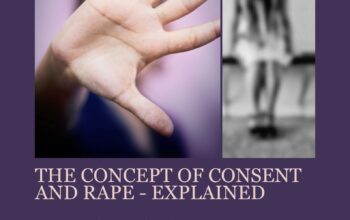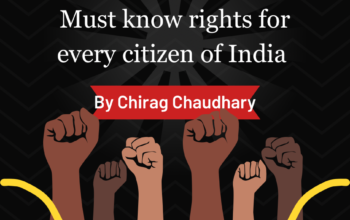This article has been written by Advocate Ankush Gupta. Ankush is a practising advocate in the courts of Haryana and deals in criminal and matrimonial matters.
Meaning of bail
Provisions regarding bail of an accused are made in the Code of Criminal Procedure, 1973 in chapter XXXIII by keeping in view the fact that ‘Freedom and personal liberty is an imperishable birthright of every individual’ and that ‘Bail is a right and jail is an exception’.
Bail means to set at liberty a person arrested or imprisoned on security being taken for his appearance at the time and place mentioned in the bond.
Objectives
The primary objective of the provisions providing for bail is not to detain or arrest the accused but to ensure the appearance of the accused at the time of trial and to make sure that if he is guilty of the offence charged, then he is available to suffer the consequences of the offence that has been committed by him as per the punishment provided by the law.
It would be unjust and unfair to deprive the accused of his liberty during the trial against him as ‘every person shall be presumed to be innocent until and unless proven guilty beyond reasonable doubt.’ Hence, the accused should not be made to suffer the punishment for the offence charged against him. That’s why provisions regarding bail have been made in the Code of Criminal Procedure, 1973.
When bail may be taken
- Bailable offences under section 436
- Non-bailable offences under sections 437and 439
- Bail in bailable offences : In the following situations, bail shall be granted as a matter of right:
(i) when a person who is accused of a bailable offence is arrested by the police officer.
(ii) when a person accused of a bailable offence appears in pursuance of summons or bailable or non-bailable warrant of arrest issued by the court.
In the above noted situations, the accused person shall be released on bail by the court or the police as the case may be, when the accused is ready to take bail.
The power to give bail in a bailable offence is available with the officer in charge of a police station and to the investigating officer also. As soon as bail bond is furnished to the police officer or the court, as the case may be, the accused shall be released from custody. An accused may be released on bail without sureties in the discretion of the court or the police officer, as the case may be, and shall be released on his personal bond without surety when he is unable to furnish security within a week of his arrest in which case he shall be deemed to be an ‘indigent person’.
- Bail in non-bailable offences : In cases where the person is accused of a non-bailable offence, bail cannot be claimed as a matter of right but as a matter of the discretion of the court or the police officer, as the case may be. Provisions regarding bail in non-bailable offences have been provided under section 437, 438 and 439 of the code of criminal procedure, 1973 which are as follows :
(i) Powers of the officer in-charge of the police station or the investigation officer or the court of magistrate to release the person accused of a non-bailable offence (Section 437) : A person who is accused of a non-bailable offence may be granted the concession of bail either by the investigating officer or the court of magistrate under section 437 in all the offences except in two cases :
- when the offence is punishable with death or with imprisonment for life; but sufficient grounds must be present for believing that he is guilty of the offences mentioned,
- when he is previously convicted of a cognizable offence punishable with death or imprisonment for life, or with imprisonment for a term exceeding 7 years,
except in some special cases, but a person under 16 years of age or a woman or sick or infirm may be released on bail even in the above mentioned cases.
An accused person cannot be denied the concession of bail only for the reason that he may be required to be identified by the witnesses during the stage of investigation if all the other conditions are satisfied.
If the offence is punishable with death, or imprisonment for life, or with imprisonment for a term for 7 years or more, then an opportunity of being heard shall be given to the public prosecutor..
Powers under section 437 can be exercised by the police officers as well as the court.
(ii) Special powers of the sessions court and the high court regarding bail (Section 439) : A person accused of a non-bailable offence even punishable with death or imprisonment for life may apply to the court of sessions or the high court, for bail if he was not released under section 437. For the application of provisions of section 437 and 439, the essential condition is that the accused must be in custody of the police or judicial custody.
For example : When the accused surrenders before the court and presses for his regular bail, then he shall be presumed to be under the custody of the court i.e. judicial custody. In this situation, the court may grant him bail in its discretion by asking him to furnish bail bond or personal bond, with or without sureties, as the case may be.
Requirements for securing bail :
- an application for bail must be presented to the court.
- the accused must be in custody.
- the bail application of the accused must be allowed by the court.
- an application for attesting and furnishing bail bond must be submitted to the trial court or the area magistrate or the duty magistrate, as directed by the order granting bail to the accused.
- if the accused is confined in any jail, then after furnishing the bail bond to the court, the court shall send a release order to the jail in which the accused is confined and then the accused will be released from the custody.
Factors that may be considered while deciding the bail application :
- nature and seriousness of the offence.
- character of the evidence.
- reasonable apprehension of tampering with the evidence and influencing the witnesses.
- possibility of fleeing from the country.
- larger interest of the public or the society.
- prima facie satisfaction of the court in support of the charges.
Cancellation of bail :
(i) by the magistrate under section 437 (5).
(ii) by the court of sessions or the high court under section 439 (2).
A person who has been granted bail may be re-arrested and committed to custody by the court of magistrate under section 437 (5) and the sessions court or the high court under section 439 (2), on the application of cancellation of bail by the public prosecutor, or the complainant, or the police officer on the ground that the terms and conditions on which the bail was granted have not been complied by the accused, or on the grounds of non-satisfaction of the order granting bail to the accused.
Provisions regarding anticipatory bail (section 438) :
A person accused of committing a non-bailable offence may apply to the court of sessions, or the high court for a direction of being released on bail if arrested on the accusation of committing a non-bailable offence.
The power of granting anticipatory bail lies with the court of sessions or the high court under section 438 and does not lie with the magistrate. The court while granting bail may impose the following conditions like :
(i) the accused will join the investigation of the case.
(ii) the accused will not leave India without the permission of the court.
(iii) the accused will not tamper with the evidence and will not influence the witnesses of the case.
This bail is also known as pre-arrest bail as it apprehends the arrest.
Non-appearance of the accused :
If the accused does not appear in accordance with the terms and conditions of
the bail, then the bail bond gets forfeited and the Court may recover the amount
of bail from the surety.
For feedbacks, feel free to contact the author at Ankush Gupta | Facebook or you may also Whatsapp him at 9034272690.



